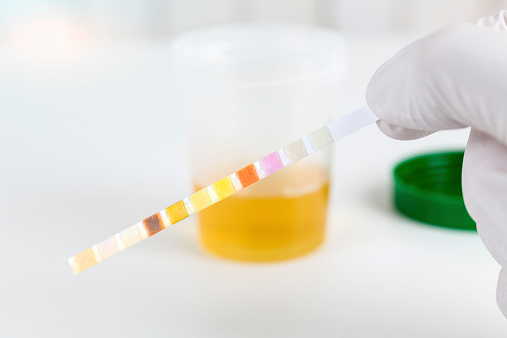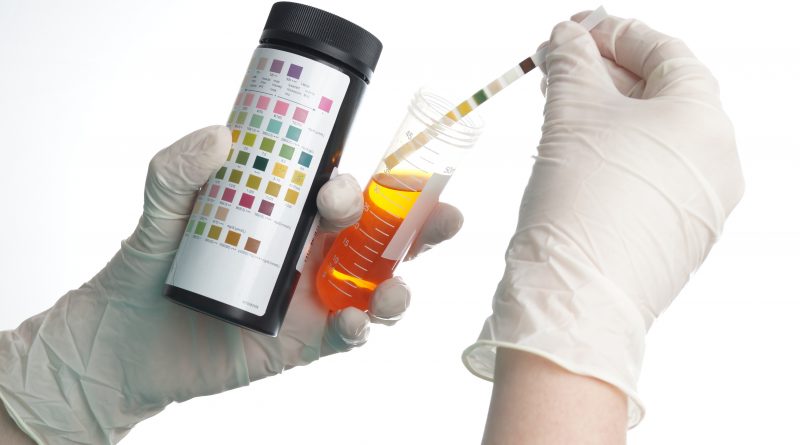Ketones in Urine, a byproduct produced when the body burns fat for fuel.
Thank you for reading this post, don't forget to subscribe!High ketone levels in urine or Ketoacidosis is a medical emergency, and it is potentially life-threatening. Progressive ketoacidosis can lead to metabolic problems; it can even lead to a coma and to death..
Ketonuria is the medical condition when ketones in urine are present. High ketone levels, in combination with high blood glucose levels (hyperglycemia), can lead to a dangerously toxic body and the condition known as diabetic ketoacidosis.
When there is too little insulin, ketones will likely show up in the blood or urine. Ketones in urine can be produced from weight loss, hyperthyroidism, prolonged vomiting, or excessive aspirin use.
Ketones in Urine or Ketonuria/Ketoacidosis
Ketoacidosis or ketonuria can occur when a type 1 diabetic doesn’t take their insulin or when insulin-dependent diabetics fail to meet the higher insulin demands from stress, injuries, or an illness etc. Ketoacidosis and ketonuria may also occur in type 2 diabetics patients who are sick and insulin-deficient.
Ketoacidosis can be the first sign of diabetes, especially when there hasn’t been a formal diagnosis.
when the diet is very low in calories, nutrients, or carbohydrates, uncontrolled diabetes may have ketones in the urine or blood without ketoacidosis.
Ketoacidosis is associated with alcoholism, fasting, starvation, ingestion of the toxic chemical isopropanol, and high-protein diets.
Diabetics may also opt for the ketogenic diet, which is low in carbohydrates and calories. In this case, the body may compensate for the lack of carbohydrates and calories by breaking down fat to use ketones for energy.
When there is enough insulin, ketoacidosis should not be a problem with the ketogenic diet.
Test for Ketones in Urine
Diabetics who take insulin and have blood sugar levels higher than 14 millimoles per liter (mmol/L) should definitely test for ketones on a regular basis.
The ketone blood test is often the most accurate method for measuring ketones; however, a urine test is most recommended by doctors. The ketones in urine tests are often measured as “spot tests.”
Reasons why a ketone test is necessary:
- It is considered a convenient method to monitor diabetics, especially when they are sick.
- It is also useful for people on a high-fat or low-carbohydrate diet to monitor ketone levels.
- Ketone testing is also used for someone that cannot eat (fasting or eating disorders like anorexia). The person may also experience symptoms of diarrhea or frequent vomiting.
- Pregnant women with diabetes or gestational diabetes should also be monitored with a ketone test. (Gestational diabetes is a form of diabetes that sometimes develops during pregnancy, and it often disappears when the baby is born).
Pregnant women may be advised to monitor ketone levels any time the blood glucose reading jumps above 200 mg/dl, or before breakfast.
One should also test for ketones in urine when he/she experience one or more of the following symptoms associated with ketoacidosis or ketonuria:
- When blood sugar number reads over 300 mg/dl.
- When one have fruity-smelling breath.
- In case of hyperventilation or trouble breathing.
- In case of dry mouth and excessive thirst.
- When one experience frequent urination.
- When one have lack energy and feel mentally confused.
- If someone have dilated pupils.
- In Case of sickness or injury. (Injuries, infections, and illnesses are causes of sudden high blood sugar levels.)
- In case of abdominal pain, nausea, or vomiting.
- If someone have flushed or dry skin, or skin lacks color.
When any of these symptoms persist, it is likely that ketone levels are high or above average.
Before test (24-48 hours) avoid all types of medications or supplements (they may falsify the test), such as glucocorticoids, levodopa, phenazopyridine, valproic acid, inositol, metformin, methionine, captopril, and ascorbic acid etc.
- A normal (negative) ketone result is under 0.6 mmol/L.
- A result of 0.6 to 1.5 mmol/L is an indication that there are trace amounts of ketones. This may also read as less than 20 milligrams per deciliter (mg/dl). Basically, there are more ketones than normal. It may be a sign that ketones are starting to build up. The test should be taken again in a few hours to see if the number changes.
- A result of 1.6 to 3.0 mmol/L is an indicator of high ketone levels, and ketoacidosis or ketonuria may be risk factors. It may also read as a moderate score of 30 to 40 mg/dl.
- Above 3.0 mmol/L is considered a dangerous ketone level, and immediate attention is required. A high score is more than 80 mg/dl.

Keep in mind that abnormal urine ketone test result may also be a result of burns, fever, acute or severe illness, anorexia, fasting, high protein or low carb diets, long-term vomiting, starvation, hyperthyroidism, lactation, pregnancy etc.
Also, make a note that exercise is never recommended when ketones in urine reveal to be moderate or high; overall, moderate to high ketones in urine are a dangerous sign that diabetes is uncontrolled.
Individually it is also good practice for patient to keep track of his/her ketone urine test results to help your doctor in the process.
How to Avoid Ketonuria or Ketoacidosis
The best way to avoid high levels of ketones in urine is by controlling blood sugar levels. A healthy diet is the best approach for blood sugar control. A good first step is the consumption of low-glycemic index (GI) foods. These foods have a GI of 55 or below.
Glycemic load (GL) foods will also be the amount of carbohydrates per serving in the particular food. Low GL foods will be 10 or less. It is important to note that foods that are low GI may not necessarily be low GL.
Type 1 diabetics should remember to inject insulin at appropriate times to avoid the buildup of ketones.
P. S : This article is only for doctors having good knowledge about homeopathy, and for learning purpose(s).
For proper treatment of Diabetes and/or Ketones in Urine (Ketonuria/Ketoacidosis), please visit my clinic. Location, address and contact numbers are given below.
NoN of above mentioned medicine(s) is/are not the full/complete treatment, but just hints for treatment; every patient has his own constitutional medicine along with these mentioned above.
For consultation, visit our clinic.
To order medicine by courier, please send your details at WhatsApp– +92319884588
 Dr. Sayyad Qaisar Ahmed (MD {Ukraine}, DHMS) ; senior research officer Dnepropetrovsk state medical academy Ukraine; is a leading Homeopathic physician practicing in Al-Haytham clinic, Umer Farooq Chowk Risalpur Sadder (0923631023, 03119884588), K.P.K, Pakistan.
Dr. Sayyad Qaisar Ahmed (MD {Ukraine}, DHMS) ; senior research officer Dnepropetrovsk state medical academy Ukraine; is a leading Homeopathic physician practicing in Al-Haytham clinic, Umer Farooq Chowk Risalpur Sadder (0923631023, 03119884588), K.P.K, Pakistan.
Find more about Dr. Sayyad Qaisar Ahmed at :
https://www.youtube.com/Dr Qaisar Ahmed
